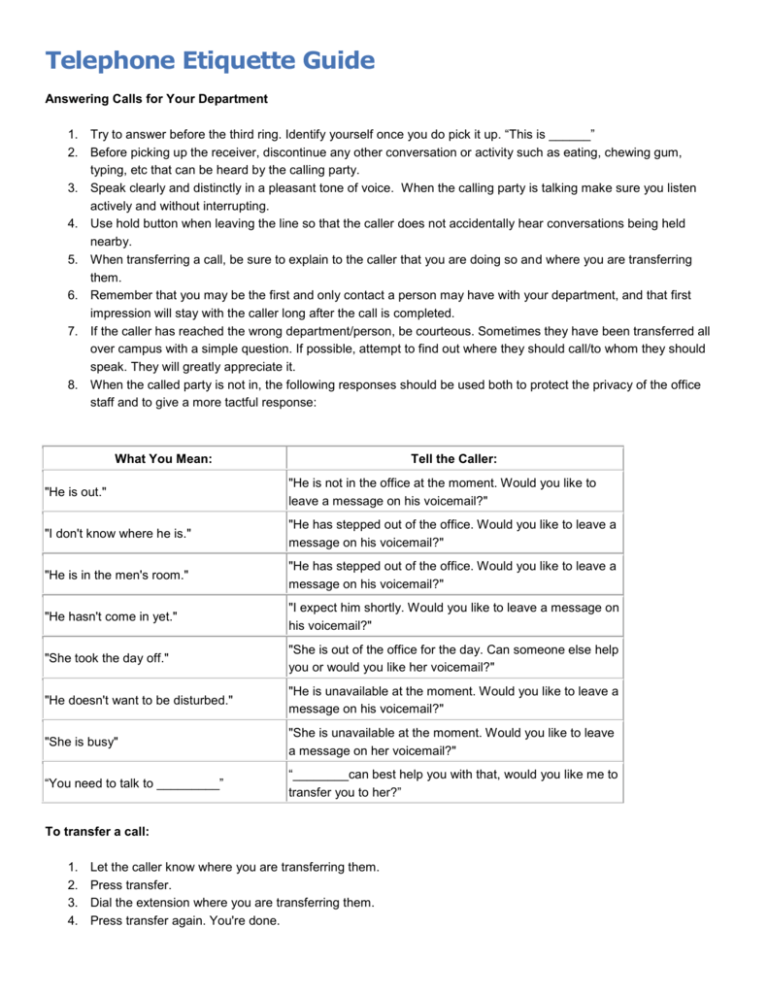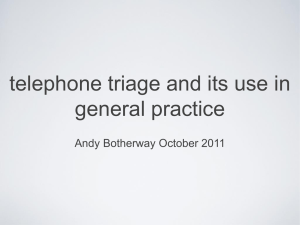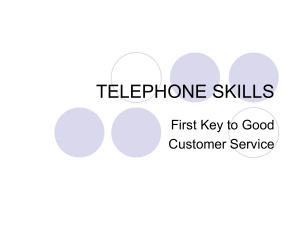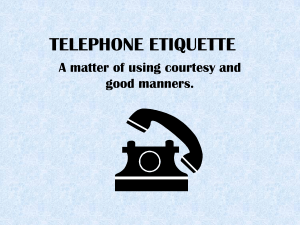Telephone Etiquette Guide
advertisement

Telephone Etiquette Guide
Answering Calls for Your Department
1. Try to answer before the third ring. Identify yourself once you do pick it up. “This is ______”
2. Before picking up the receiver, discontinue any other conversation or activity such as eating, chewing gum,
typing, etc that can be heard by the calling party.
3. Speak clearly and distinctly in a pleasant tone of voice. When the calling party is talking make sure you listen
actively and without interrupting.
4. Use hold button when leaving the line so that the caller does not accidentally hear conversations being held
nearby.
5. When transferring a call, be sure to explain to the caller that you are doing so and where you are transferring
them.
6. Remember that you may be the first and only contact a person may have with your department, and that first
impression will stay with the caller long after the call is completed.
7. If the caller has reached the wrong department/person, be courteous. Sometimes they have been transferred all
over campus with a simple question. If possible, attempt to find out where they should call/to whom they should
speak. They will greatly appreciate it.
8. When the called party is not in, the following responses should be used both to protect the privacy of the office
staff and to give a more tactful response:
What You Mean:
Tell the Caller:
"He is out."
"He is not in the office at the moment. Would you like to
leave a message on his voicemail?"
"I don't know where he is."
"He has stepped out of the office. Would you like to leave a
message on his voicemail?"
"He is in the men's room."
"He has stepped out of the office. Would you like to leave a
message on his voicemail?"
"He hasn't come in yet."
"I expect him shortly. Would you like to leave a message on
his voicemail?"
"She took the day off."
"She is out of the office for the day. Can someone else help
you or would you like her voicemail?"
"He doesn't want to be disturbed."
"He is unavailable at the moment. Would you like to leave a
message on his voicemail?"
"She is busy"
"She is unavailable at the moment. Would you like to leave
a message on her voicemail?"
“You need to talk to _________”
“________can best help you with that, would you like me to
transfer you to her?”
To transfer a call:
1.
2.
3.
4.
Let the caller know where you are transferring them.
Press transfer.
Dial the extension where you are transferring them.
Press transfer again. You're done.
Words and Phrases that help you sound polite and professional
Hello! I'm sorry to keep you waiting.
Good morning!
Thank you for waiting.
It was nice talking with you.
Please.
Thank you.
Is there anything else I can do for you?
I'm very sorry.
Thank you for coming in (or calling).
It's been a pleasure to serve you.
You're welcome.
I'd be happy to do that for you.
May I help you?
Good Telephone Procedures
Remember that you are representing your department and etiquette is very important. Using phrases such as "thank you"
and "please" are essential in displaying a professional atmosphere. {You can tailor this section for your department's
needs}
Make sure to answer before the third ring.
o Examples of greetings can be: "(department name), may I help you?" OR "Good morning"...you get the
idea. Use a greeting that is going to give the caller the impression that we are in fact professional and
pleasant.
If you are currently on one line and another line rings:
o Tell the first caller to "Please hold."
o Place caller on hold.
o Answer the ringing line saying, "[Department name]--please hold."
o Place second caller on hold.
o Return to first caller and complete the call.
o Go back to the second caller.
o Say, "Thank you for holding, may I help you?"
Taking Messages
1. Be prepared with pen and message slip when you answer the phone.
2. When taking messages be sure to ask for:
1. Caller's name (asking the caller for correct spelling.)
2. Caller's phone number and/or extension (including area code)
3. If the caller is a student, ask for the Student ID# (if appropriate) and ask what the call is in regard to.
3. Repeat the message to the caller.
4. Be sure to fill in the date, time, and your initials.
5. Place the message slip in the called party's inbox or in a conspicuous place in their office, such as their chair.
6. Don't forget that you can transfer them to voicemail instead of taking a paper message, but don't forget to ask,
"Would you like me to transfer you to ______'s voicemail?" Do not assume that the caller would rather go to
voicemail. Always ask first.
Handling Rude or Impatient Callers
1.
2.
3.
4.
Stay calm. Try to remain diplomatic and polite. Getting angry will only make them angrier.
Always show willingness to resolve the problem or conflict.
Try to think like the caller. Remember, their problems and concerns are important.
Offer to have your supervisor talk to the caller or call him/her back if the caller persists.
Good Telephone Habits for Everyone
Proper etiquette leaves callers with a favorable impression of you, your department, and Edgewood College in general.
You'll also find that others treat you with more respect and are willing to go out of their way to assist you if you use the
proper etiquette.
Making Calls
1. When you call someone and they answer the phone, do not say "Who am I speaking with?" without first
identifying yourself: "This is _______. To whom am I speaking?"
2. Always know and state the purpose of the communication.
3. When you reach a wrong number, don't argue with the person who answered the call or keep them on the line.
Say: "I'm sorry, I must have the wrong number. Please excuse the interruption." And then hang up.
4. If you told a person you would call at a certain time, call them as you promised. If you need to delay the
conversation, call to postpone it, but do not make the other person wait around for your call.
5. If you don't leave a number/message for someone to call you back, don't become angry if they are not available
when you call again.
Voicemail Etiquette
Checking Messages and Returning Calls
1. Check your messages daily and return messages within 24 hours. If it will take longer than 24 hours, call the
person and advise him/her. Callers should feel comfortable that you are checking your voicemail daily.
2. Reply, forward, or delete messages immediately. Keep your mailbox clean. Saved messages kept longer than a
week take up needless space in your mailbox since there is a limit to the number of messages, including saved
messages.
3. If you forward a message, be sure to explain to the person to whom you are forwarding the message why you are
sending it to them.
Leaving a Voicemail Message
1.
2.
3.
4.
5.
6.
Speak clearly and slowly.
Be sure to leave your name and extension number. It's best to say it at the beginning and end of your message.
Keep messages short and to the point.
Remember that you want to leave the person you are calling with a good impression of you.
Leave the date and time you called in the message. Let the person know the best time to call you back.
Cover one topic in one message; specify what you want the recipient to do.
Are You Sure You're Understood?
To prevent misunderstandings, listen closely to what you say. Try these tips:
Check your presentation. Speak distinctly at a moderate pace, with enough volume to be heard clearly. Don't
mumble, turn away from the phone, or rush through sentences.
Stay with your caller. Don't give important information when the caller doesn't appear to be listening. Instead, use
an introductory phrase to get the caller's attention: "Sir?" "Ma'am?" "Excuse me…"
Use everyday language. When you must use a term callers may not understand, explain it: "You will need to fill
out a post-census withdrawal form - that is the blue, two page form required for all late withdrawals from classes."
Repeat, or spell out, information. All names, addresses, numbers, and dates should be repeated or spelled out.
And be specific. Instead of saying, "We'll be open again tomorrow," say "We'll be open from 8am-5pm tomorrow."
For confusing numbers, say, "That's 30: three-zero" or "13: one-three."
Ask for feedback. You can "quiz" your callers on how well they're listening by asking them to repeat information.
Say: "Do you mind repeating that number back, so I can be sure I gave it to you correctly?"
Encourage questions. This technique is especially useful for complex topics. Again, be careful that you don't talk
down to the caller: "I know I've covered a lot. Is there anything you'd like me to review?" Or, "Before we hang up,
is there anything I was not clear about?"





